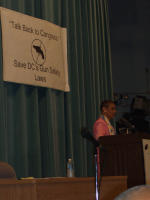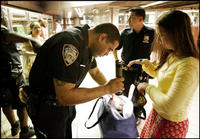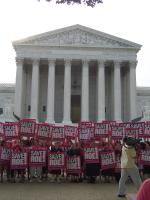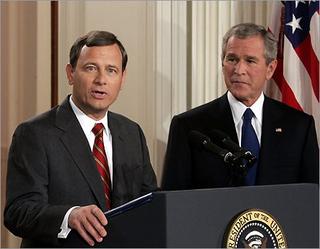D.C. Young Republicans Speak Out
Against D.C.'s Dangerous Gun Laws
The entire first hour featured keynote speeches by Norton, Mayor Anthony Williams, and Police Chief Charles Ramsey. Throughout the night, Norton reinforced her image as a hard-hitting politician, while little that Williams said was memorable (he would probably rather talk about baseball). Chief Ramsey, on the other hand, came across as a level-headed, thoughtful individual without a partisan edge.
Norton began her speech by claiming that she sought to challenge three assumptions, namely that

(1) “Congress has the right to change the local laws of any jurisdiction,”
Response: Of course Congress has the right with respect to the District. See Article I, Section 8 of the Constitution: Section. 8. “The Congress shall have Power . . . To exercise exclusive Legislation in all Cases whatsoever, over such District (not exceeding ten Miles square) as may, by Cession of particular States, and the Acceptance of Congress, become the Seat of the Government of the United States.”
(2) That “somehow people will be safer if more guns are in the District,”
Response: John R. Lott’s book More Guns, Less Crime explains exactly why that is so
and
(3) Since people living in D.C. don’t have equal representation in Congress, there is nothing they can do about guns.
After the politicians consumed the first hour, the people were allowed to speak, so long as they lived in the District, submitted their question in advance, and survived Norton’s vetting process. Twenty people had the opportunity over the hour, approximately one person every 3 minutes, including politician responses. Although the audience was evenly divided, the speaker numbers ran as follows: 15 pro-gun control, 3 against, and 2 neutral.
Two pro-gun control speakers were interesting. A Hispanic woman spoke of people coming from violent Latin American countries who were appalled to hear that the gun laws were being challenged. She turned into a screamer and garnered a lot of applause. A pastor from Ward 6 said, “You can’t be pro-God, pro-family, and pro-gun.” Tell that to the patriots who founded this country. A running theme among all speakers was that Congressmen from Indiana and Texas should not be meddling with local gun control laws passed by D.C.
The two “neutral” speakers were very intriguing. Norton introduced one of these speakers by noting that he had “an interesting notion I have never heard before,” which is striking because I heard of this “interesting notion” years ago. The gentleman pointed out that blacks have historically been singled out for disarmament by gun control advocates. Indeed, he is correct: the Republicans pushed for the 14th Amendment’s equal protection provisions in part because Southerners were passing gun control laws that applied only to black folks. It’s easier to lynch an unarmed man.
The other neutral speaker was a student, the only young person to speak, who claimed that he was not permitted to visit other schools to speak about gun safety. Protecting children is the ostensible impetus behind the D.C. gun law that the House undermined, but this young man claimed he was not permitted to educate his peers on gun safety.
DCYR member Eric Wright walked to the microphone to relate his story of being attacked three times by homeless people and being shot at while he was driving in Rock Creek Park. "I deserve the right to defend myself. I deserve the right to carry a weapon by my side. I'd like to know why people believe I don't have that right."
In response, Norton deftly took the focus off of the three close encounters Eric experienced-- which conceivably called for a self-defense response --by focusing on the one incident that occurred while he was driving. She mocked him by asking: if he had a gun, would he have stopped the car and run after the assailants in order to shoot them? But responsible, law-abiding gun owners are not hot-headed vigilantes. The reality is that virtually no individual licensed to carry a concealed firearm has ever been charged with a crime in connection with that firearm. Apparently, Norton has watched too many Hollywood action movies.
Finally, with about 15 minutes left in the meeting, my opportunity came. First, I pointed out that no speaker that evening had specifically discussed the merits of the legislation they were protesting. Namely, the House voted to defund the provision of D.C. law that requires owners of rifles and shotguns (handguns are prohibited) to store their weapons in the home either disassembled and unloaded, or locked with a trigger lock. No one used the words “trigger lock” once the entire evening! The House had not voted to defund the enforcement of all of D.C.’s gun laws.
Second, I noted that many speakers and Norton had expressed outrage that the Congress had acted to intervene. I pointed out that Republican Congressman Tom Davis had a strong bill to grant a vote for D.C. in the House that Norton did not support. Norton bristled at my comment, which was technically true. She commented later that it was her prerogative to support her own bill to the exclusion of Davis’s, which is a fair position. However, Norton’s bill will certainly not pass the Republican Congress.
Then I asked my question: Consider a woman who has already sought a restraining order against her estranged husband or ex-boyfriend. The Supreme Court recently ruled that the government has no legal duty to enforce a restraining order. The man has threatened to kill her in the past and now he is breaking down her door. The police will not arrive in time. What should she do? Charles Ramsey responded first with statistics purporting to show that guns are bad in domestic violence situations. He didn’t suggest the police would save the day (by the way, have Ramsey’s officers recovered his stolen car yet?). Norton launched into a boisterous response, but I was distracted by a Post reporter. I don’t think she gave any useful advice to the hypothetical woman.
My answer is that her options are as follows: (a) the woman violates D.C. gun laws and has a gun ready to fend off the man until he leaves peacefully, (b) she takes her chances fumbling with a trigger lock under stressful conditions, (c) she runs (not an option if that would require her to abandon children), and/or (d) she prays.

The evening ended with Norton introducing a special speaker, a woman who had lost her child to gun violence. Her lecture began well enough, but it ended with several minutes of unintelligible screaming that lacked the warmth of heavy metal music. It was a display of pure emotion, a lot of genuine pain, but not a solid basis for devising public policy. Individuals began walking up to the front to join her, and finished by singing a rendition of “We Shall Overcome.”
After all the screaming, it was definitely time to head to U Street for a drink.









